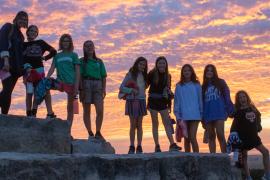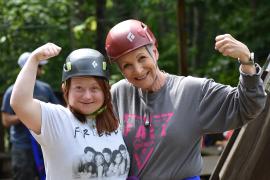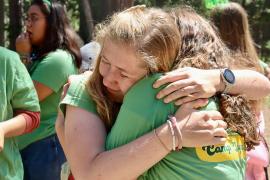Mental and emotional health has been on the forefront of all of our minds. During COVID, it is even more so. While camp is for the camper, our staff are the ones interacting and supporting them daily. What do we do when our staff cannot hold it together? What tools do we give them to be mentally and emotionally stable so they can support our campers’ well-being? How do we balance providing services for our staff while also needing them to do their job?
These are all HARD questions and ones that if, you are in a position of leadership, you have probably wrestled with in the last few years. So . . . what do we do?
Let’s start by defining what “holding it together” means. For these purposes, a staff member is holding it together when they are doing the following:
- Doing the essential functions of the job mindfully and safely, while giving campers a fun experience
- Engaging campers and staff in healthy conversations and activities
- Helping your organization fulfill its mission
What does NOT holding it together look like?
This can be presented in multiple ways depending on the staff member, the circumstances, the environment, and more. In a nutshell, the underlying core is that the staff member cannot manage the job, is distracting from your mission, and is taking time and resources away from your customers, the campers.
What do we do when we have a staff member who is not holding it together?
To put this most simply, you have three options:
1. You ignore them. (Never a great option. Just think about the consequences of this!)
2. Address the situation with the staff member head on and RAA! Redirect, Adapt, and Adjust.
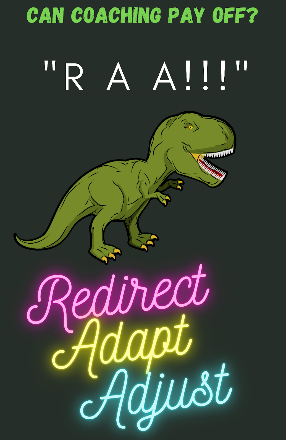
3. Have the staff member move on, ideally coming to this decision by themselves with your support.
Now to the action part. What can we do as leadership staff to help our staff be mentally and emotionally stable so they can support our campers’ well-being?
This can be addressed in many ways — and it is, in fact! The camp community is so creative. Here are some takeaways from our camps that have helped support our staff.
Prevention. Prevention. Prevention.
This starts in the interview process. Address self-care with potential applicants. One question we ask is: Camp is busy and nonstop at times. Personal time and space are limited and this can be hard for people. What practices for self-care do you have now that you will bring to camp?
This is just one way to engage the conversation and start talking about mental health and self-care.
Knowledge and Ownership
Knowledge is power and talking about mental health as a community during staff training not only empowers staff; it communicates to them that you value mental health. Here are two ideas of how to incorporate this with your staff:
- Bringing in an outside trainer to speak to your staff about healthy self-care during camp will enrich your training. There are many ways you can do this under a budget. Check out your camp parents and see if any of them are therapists that would be willing to share their expertise in exchange for some tuition.
- Take this a step further and have them be your “on-call” camp therapist for the summer. Your staff then have a connection with this person from training and you have an expert that can help you navigate tough situations. (Remember — we are camp leaders, not therapists, and sometimes we need an expert to help make those tough decisions.)
- Teach your staff the acronym GRAPES for self-care. Begin in training by having them do at least one of these actions a day. The idea is to turn this into a habit or a community norm that will benefit them throughout the summer. GRAPES stands for:
- G: gentle with self (name something you are thankful for)
- R: relaxation (practice yoga or meditation)
- A: accomplishment (reflect on something you are proud of)
- P: pleasure (read a book)
- E: exercise (go for a hike)
- S: social (spend time in the staff lounge)
Intentional Community
We believe all camp directors set up their community with intention. This is one of our best leadership skills. When it comes to staff support, here are a few things you can do to let your staff know they are valued.
- Consider going unplugged. Yep. That’s right. Don’t allow your staff access to their phones unless it is their time off away from camp. We promise this is an investment worth considering. Imagine this- instead of your staff spending their time off scrolling through TikTok, they are actually resting, or being social with a fellow staff member, or taking a walk (GRAPES for the day!). Activities that are proven to restore versus the endless drain of the internet. Yale Professor, Dr. Laurie Santos says we have to teach youth and young adults how to decompress in healthy ways (taking a walk versus binge watching netflix). Camp is a fantastic opportunity to do this.
- Assign a leadership staff member to the staff lounge each evening. One of this person’s main roles is to help guide the conversation. Venting happens in the staff lounge, we all know that. But at what point does it become toxic? This toxicity is what we want to avoid.
- Train your leadership staff to allow the vent (10-15 minutes) and then address it by saying things like, “I hear that you are frustrated with this situation. Do you want to problem solve with me or would venting privately to me for another 5 minutes help you right now?”
- Surprises throughout the summer. These can be extravagant (massage for all your staff) or completely free. Whatever your budget is, we encourage you to “give” to your staff. One budget way you can do this is to put each staff member’s name on a piece of paper, hang it up in a central location, and have folks write affirmations on the paper for that person. Another idea: offer a chacos/shoe bath for your staff, where you wash all of their stinky footwear mid-summer. It’s a small thing that shows gratitude.
To recap thus far, we have given some ideas for support and how to assess when your staff are enriching or taking away from your mission. But there is still the question of: How do we balance providing services for our staff while also needing them to do their job? This question is critical because while we love our staff and want to give them all the resources and support they need, sometimes it can be too much….how do we determine when it is?
We hear the phrase a lot “camp is for the camper”. We encourage you to use this phrase as a compass point: if camp is better for the staff member than they are to camp, it is not fair to the camper. Remember your mission and always focus on the camper experience first. To break this down even deeper, use your staff evaluation as a guide, a barometer. We like to use a grid from Scott Arizala’s S’more Than Camp Book:
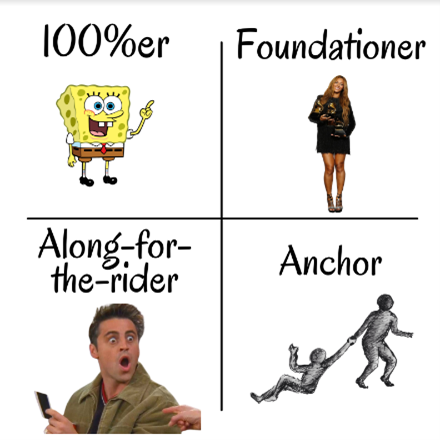
Think about it this way: If you are having to make accommodations for the staff person so that their presence at camp is impacting camp in a negative way, then it might be time to let the staff member move on. Think about the staff member’s co-workers and how they are affected if the staff person is late, unmotivated, and/or disengaged. If this staff person is an anchor - literally dragging down anyone they are placed with, then it is negatively impacting the camper experience, and it is time to move that staff member along.
Remember that mental health support is no different than physical health support. If a staff member leaves a position early in order to prioritize mental health, it should not disqualify them from future positions. If you had a counselor leave camp because they broke both legs mid-summer, you wouldn’t think: “oh no, don’t hire them again, they will surely rebreak their legs!”.
But, if you see that counselor trying to make a water ski pyramid at staff training, you would remind them to prioritize their predisposition to injury, and make safe choices for their body. The same goes for mental health. Give the staff another chance, but make sure they have new and appropriate strategies to help them be successful in the future.
Staff needing this support is the new reality. This is not a *new* generational trend, but the opportunity to talk about this support more openly, because young people are given the tools and vocabulary to advocate for themselves and their specific needs (and this is a good thing!).
This blog was written on behalf of Project Real Job whose purpose is to support camps in their efforts to recruit, hire, and retain staff.
Amber, Anne, Jalisa, and Elizabeth have been meeting regularly as a Mastermind group for 7 years! They met at an ACA event and have found sharing resources, experiences, and camp trials and tribulations incredibly valuable for their leadership development. This article is a compilation of all of their shared experiences (and some of the more successes they have discovered). Please feel free to reach out to any of them for additional information.
Amber M. Grundy, PhD
CEO, Camp Fire River Bend
[email protected]
Anne Izard
Executive Director, Green River Preserve
[email protected]
Jalisa Danhof
Director, Camp Newaygo
[email protected]
Elizabeth Shreckhise
Director, Camp Alleghany for Girls
[email protected]
Photo courtesy of Camp Chewonki in Wiscasset, Maine
The views and opinions expressed by contributors are their own and do not necessarily reflect the views of the American Camp Association or ACA employees.

